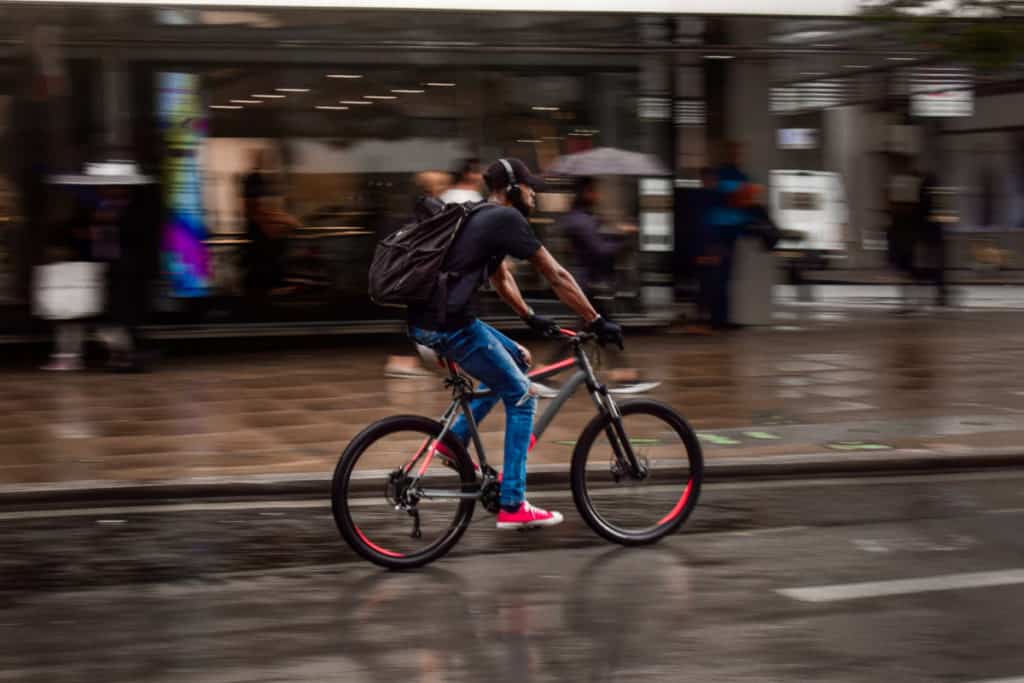
If you are thinking about Cycling to Work, but can’t quite take the leap, this article may peak your interest……It’s all about the money!!!!!
So, how much money can you save cycling to work? Calculations show that cycling to work can save the average person around £2000 per year depending on your annual mileage. Even bigger savings can be made if you look into the numbers more closely, so let’s dive in!!
| Daily Commute Distance | Annual Average Cost on Bike | Annual Average Cost in Car | Average Bike Commute Saving per Year |
| 10 miles (16 km) | £615 | £1,170 | £555 |
| 15 miles (24 km) | £640 | £1,755 | £1,115 |
| 20 miles (32 km) | £665 | £2,340 | £1,675 |
| 25 miles (40 km) | £690 | £2,925 | £2,235 |
One of the major and understated benefits of cycling to work, in addition to health, wellbeing and environmental benefits, is the amount of hard earned cash that can be saved by swapping out the car and opting for the bike. There are many schemes available that can save you money on purchasing your bike and cycling equipment, BUT how much money can YOU actually save by cycling to work?
Our numbers in the table give an indication as to what benefits are on offer but obviously this will depend largely on assumptions and circumstances but this is a good conservative indication as to what can be saved. Let’s look at how those numbers break down!
Bike Commuting Annual Costs
The cost of commuting by bike is basically a fixed cost spread over the length of time the bike is serving you!! The only difference is to account for potential extra maintenance costs for longer commutes. It makes sense that the more distance you cover, the more wear and tear on the bike, right?
Whilst this is true, a good quality bike that is suitable for the terrain will cope very well with long commutes, they are designed for it!! Modern bikes are unbelievably low maintenance and reliable so you can have confidence in your equipment. Maintenance costs are also very reasonable as you will discover later in this article.
There is no additional cost for fuel which can fluctuate regularly based on price increases and increases the more distance you travel. There is no cost for road tax and breakdown cover making cycling a really cheap mode of transport, second only to walking, and offering significant savings over the car and public transport options.
All you need is a bike, some gear and a whole bunch of pedal power and you are all set. Here is how this costs compare!
Cost of the Bike and Gear
Assuming you buy a decent road bike and a bunch of gear lets assume the cost was £1000, £750 for the bike and £250 for essential gear. If you used a scheme for purchasing your bike, such as Cycle Scheme or Bike to Work Scheme, the cost to you will reduce based on your income tax bracket i.e. a standard rate taxpayer can deduct 25% from the cost of the bike and gear through the UK government schemes. These savings are even bigger if you are a higher rate taxpayer!
Our numbers given above in the table do not include this additional saving, so if this is something you can go for it would be well worth it!!

To get started, and begin you Bike Commute adventure, your minimum kit list will look something like this:
- Bike suitable for the terrain you will commute on
- Suitable Helmet of good quality
- Front and Rear bike lights
- Bike lock (unless you trust your work colleagues)
- Spare tubes in case of puncture
- Pump, which can be easily mounted to the bike
- Small multi tool, useful but not essential
- Saddle bag hold sparer tubes and essentials
- Padded shorts to make that journey a little more comfortable until you get used to it!!!
- Backpack for lunch, spare clothes any anything else you may need to carry
You will not need much else to get going, and arguably some of the kit above are non essential. This kit list should fall easily within the £1000 range, including a decent bike option, and for that cost you can get good quality gear. Cheaper options are always available which can be considered but if you are commuting regularly, it is worth spending a little more to make the commute that much more efficient and comfortable.
Don’t feel that you need to go all in on the best gear, matching bib shorts and cycling jersey and a whole array of accessories. Whilst these things may make your commute fractionally more pleasant, they are certainly not essential to get started.
Loose, comfortable clothing, whilst generating a fraction more wind resistance than the lycra counterparts, are more that adequate to start your bike commute. You are not in the Tour de France after-all, you’re are on your way to work!! You can always upgrade later if desired, you can even use the cash you save by doing so!!!!
Depreciation of Cycling Equipment
Remember, like everything else, bikes and cycling gear will depreciate so you have to consider this when determining the cost of cycling. Our calculation assumes you will keep the bike and gear for 5 years. This is a reasonable assumption and a quality bike, when looked after, will last beyond 5 years. If, like me, you get the cycling bug you may end up swapping the bike sooner than this.
Assuming a 5 year period, we have assumed the value of £750 bike will depreciate by a fifth for each year of ownership. Hence, the depreciation is approximately £150 for the bike for the year. However, if you look after your bike through its time with you, you will still be able to re-coup some cash as a second hand sale, if you maintain good used condition.
Once purchased, cycling gear will loose value almost immediately as second hand gear is less desirable, but if we assume depreciation at the same rate, the total depreciation of our bike and gear investment is £200 per year. No-body will want your sweaty cycling gear I am afraid!!
Insurance Costs for your Bike
You may choose to insure your bike in case of theft or damage. This is a good idea if you buy a bike through a cycle to work scheme as loss or damage would be your responsibility and you would still owe money to the scheme even if the bike was no longer in your possession.
According to Pedal Sure, a leading online insurer of bicycles, the cost of insuring a £750 valued bike for a 38 year of male living in the Midlands in the UK, will set you back approximately £65 per year. Obviously this will vary on your personal circumstances, like any other insurance product, but this gives you the indication of the reasonable cost of insurance to ensure you can commute with peace of mind!
Maintenance and Running Costs of your Bike
Like all mechanical assemblies, bikes do suffer from damage, as well as water and tear. the frequency and cost of maintenance will depend largely on the amount of use. Bikes are built to high quality standards and do not suffer from many issues if they are cared for.
Maintaining your bike is more than just clearing it. It is important to check components not only to keep the bike running smoothly, but also to keep it safe.
Many companies offer service packages which you can usually add on to your purchase of the bike. Tredz offer a Gold service for £100 which is very reasonable. This is a comprehensive service of all aspects of the bike including replacements for wear parts. A gold service annually should be more than ample for a standard commuter.
Add onto that, the normal costs of running a bike such as oil for the chain, a few spare tubes in case of punctures and the total cost annually shouldn’t stretch to any more than £150 including the service. Obviously this will alter depending on the weekly mileage you are racking up but its a good estimate.
In the number given here, we have assumed an annual jump of £25 for each five miles increase of commuting distance.
Additional Food Costs whilst Cycling to Work
Bike commuting sure does make you hungry, you are burning calories and not fuel!!!
Obviously with burning the extra calories from expending energy whilst cycling, chances are you will feel more hungry that normal if this is an increase in weekly activity for you. If this is the case, then enjoy the extra snacks or relish in the fact you will be fit and healthy in no time and the envy of all the town on this years beach holiday! Our calculation neglects any additional cost here, anyway doesn’t driving make you hungry too??
Driving Costs vs Bike Commute
Obviously there are a lot of variables when calculating the cost of driving. Some of the variables are listed below but this list is far from exhaustive:
- Total mileage covered
- Type of car
- Cost of car
- Fuel
- Insurance
- Finance and interest
- Depreciation
- Maintenance
According to an article from the RAC, running a petrol car with a 1400 CC engine typical costs the consumer £0.33 per mile excluding petrol. Assuming a stable petrol cost of £1.20 per litre, the fuel cost alone is £0.12 per mile which gives a total cost of £0.45 per mile.
Depending on the length of the commute, this has a significant impact on the amount of money cycling to work can save you over the course of a year.
It is apparent that choosing to cycle to work can have a big impact on your health and your wallet, so why not jump in the saddle!!!


